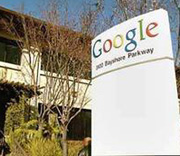|
 So you've spent an hour Googling through the Web for your graduate research paper, you've played the Google drinking game, heard the Google theme song and vanity-Googled yourself. So you've spent an hour Googling through the Web for your graduate research paper, you've played the Google drinking game, heard the Google theme song and vanity-Googled yourself.
Just for a change you turn on the TV and find they're even talking about Google on "Sex and the City" and "The West Wing."
What the heck was life like before Google?
The last six years have seen Google become not just the world's most popular Internet search engine but a verb, a
household wordand a cultural phenomenon.
And on Thursday it entered a whole new chapter when it filed with the
Securities and Exchange Commissionto become a publicly listed company and sell .7 billion in stock.
Google's the place people turn to in more than 80 languages more than 200 million times a day if they want to locate a long-lost friend, find a recipe for
maple walnut mousse pieor research a business competitor on a different continent.
And Google delivers the answers with such ease, without fear or favor, that New York Times columnist Thomas Friedman was moved to ask last year "Is Google God?"
"There are clearly a lot of people who spend a lot of time with it and feel close to it," said Joe Janes, a University of Washington Information School professor who taught the world's first university course on Google this spring.
"I don't think I would go as far as saying people treat it as a friend but it fills a couple of those roles -- it helps you find things, it's always there.
"People now use Google as a verb and Googling people before they go on dates. When it gets to prime time television that's a sign it has become a cultural phenomenon," Janes said.
SERIOUS WITHOUT THE SUITS
Garrett French, 27, editor of the WebProNews.com online newsletter for Internet professionals, can barely recall life without it. "For as long as I can remember, I've been using Google for work and for leisure," said French.
Information before Google was a tough and often dull business before Stanford graduates Larry Page and Sergey Brin came up with an
algorithmthat searched and ranked Web pages on the basis of "importance" value to determine their usefulness.
Students trudged to libraries, journalists rifled through dog-eared contacts books and computer neophytes struggled with search engines that required precision spelling,
hyphensand
slashesin the right order.
But Google -- a play on the word googol which means the number one followed by 100 zeros -- made Internet searching not just easy but fun.
Whacky logos, tales of life in the Googleplex headquarters where the company chef used to work for the rock band Grateful Dead, the organizing principles of "You can be serious without a suit" and "You can make money without doing evil" took the Internet out of
geekdomand turned it into something cool.
Sometimes the joke has turned sour. "Google-bombing" was invented by a tech-savvy
pranksterwho last year devised a way of linking the search words "miserable failure" to President Bush's official biography Web site.
"Google-whacking" became a sport of producing a search query using such bizarre words that only one result is returned.
MIND-BOGGLING FUTURE
Richard Brandt, author of an upcoming book "In Search of Google" said that Page and Brin's genius was in realizing that the Internet was not a series of disconnected sites but information treasure
trovesthat were linked and which influenced each other.
"They understand the Internet, how it works and how people use it. Google is all about inventing new ways of finding the information you want.
"Larry and Sergey take that role very, very seriously. The stated role of the company to 'do no evil' is deadly serious. It is one of the things that has helped make people love Google, and use it and trust it," Brandt said.
If life before Google is difficult to recall, the next six years promises to be mind-boggling.
Google is already working on a personalized search engine that "learns" what individuals like, find relevant or prefer to avoid.
Google's Chief Technology Officer Craig Silverstein spoke last month of a future in which people could have "search pets" that are able to find the answer to tricky questions such as "What did my wife mean when she said that?"
Larry Page revealed his own vision at a technology conference in February. "On the more exciting front, you can imagine having your brain being augmented by Google. For example you think about something and your cell phone could whisper the answer in your ear."
|
